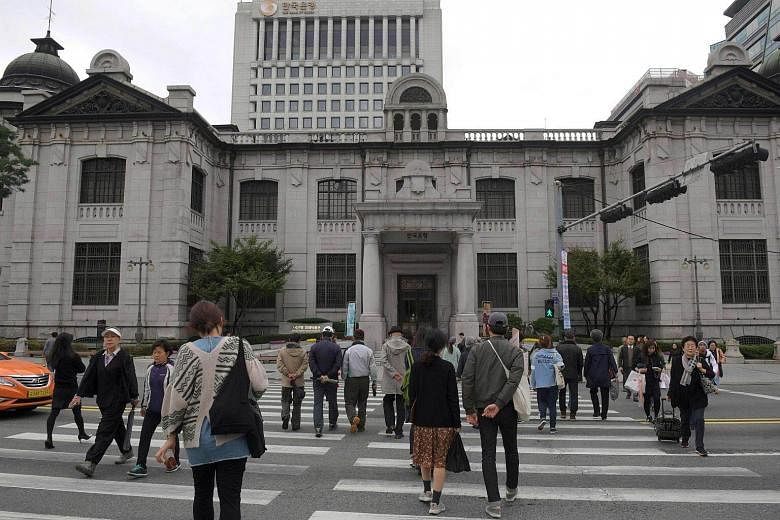SEOUL (BLOOMBERG) - South Korea's central bank left its policy rate unchanged for a seventh month on Friday (Jan 13), reflecting caution about financial stability in the face of slowing growth.
The Bank of Korea kept the seven-day repurchase rate at a record-low 1.25 per cent, a decision expected by all 21 economists surveyed by Bloomberg.
Attention will now turn to Governor Lee Ju-yeol, who is scheduled to present the central bank's updated growth and inflation forecasts for 2017 during a news conference at 11:20am in Seoul.
Economists expect the BOK to cut its growth projection for gross domestic product this year. Although South Korea's exports have improved recently, sentiment remains poor and risks include possible rate increases by the Federal Reserve and further domestic political turmoil.
"The interest is on the revised economic outlook rather than the widely expected rate-hold decision," Kim Sang-hoon, a fixed-income analyst for KB Investment & Securities in Seoul, said before the decision. "The central bank will probably lower the growth forecast to mid-2 percent, but Lee will seek to ease rate-cut expectations by emphasizing financial stability."
In October, the BOK projected growth of 2.8 per cent this year and inflation of 1.9 per cent. The government in December said it expects growth of 2.6 per cent and inflation 1.6 per cent.
Record household debt will make it difficult for the central bank to cut or even raise rates because it doesn't want to fuel an increase in the debt or in consumers' repayment burdens, Kim said.
Household debt hit 1,296 trillion won (S$1.57 trillion) as of end-September. While policy makers have said the amount doesn't pose an immediate risk to the financial system, they have expressed concern that rising bond yields at home, in line with a global move, may increase default risks for low-income debtors.
Global trade could threaten Korea's exports, which grew in December for a second consecutive month, the first two-month expansion since 2014. US President-elect Donald Trump's policies are seen as a risk to world trade, and modest global growth may limit any recovery for South Korean shipments.
The outlook for domestic demand is dim. Consumer sentiment plunged in December to the lowest level in more than seven years amid a political scandal that led to the impeachment of President Park Geun-hye.
The Korean won fell 1.4 per cent in the past month to 1,184.88 against the dollar as of 3:30pm on Thursday in Seoul, making it the biggest loser among major Asian currencies. The yield on five-year government debt dropped 18 basis points to 1.79 per cent, Korea Exchange data show.

